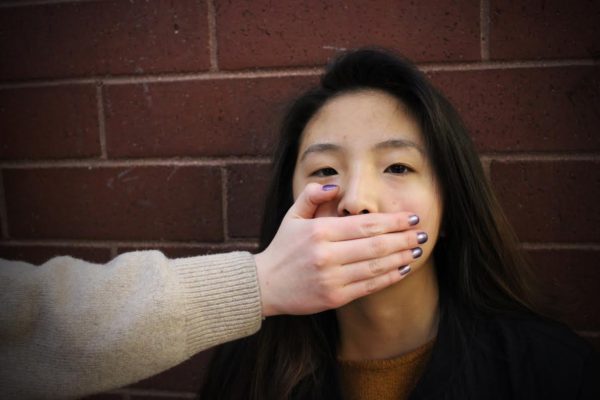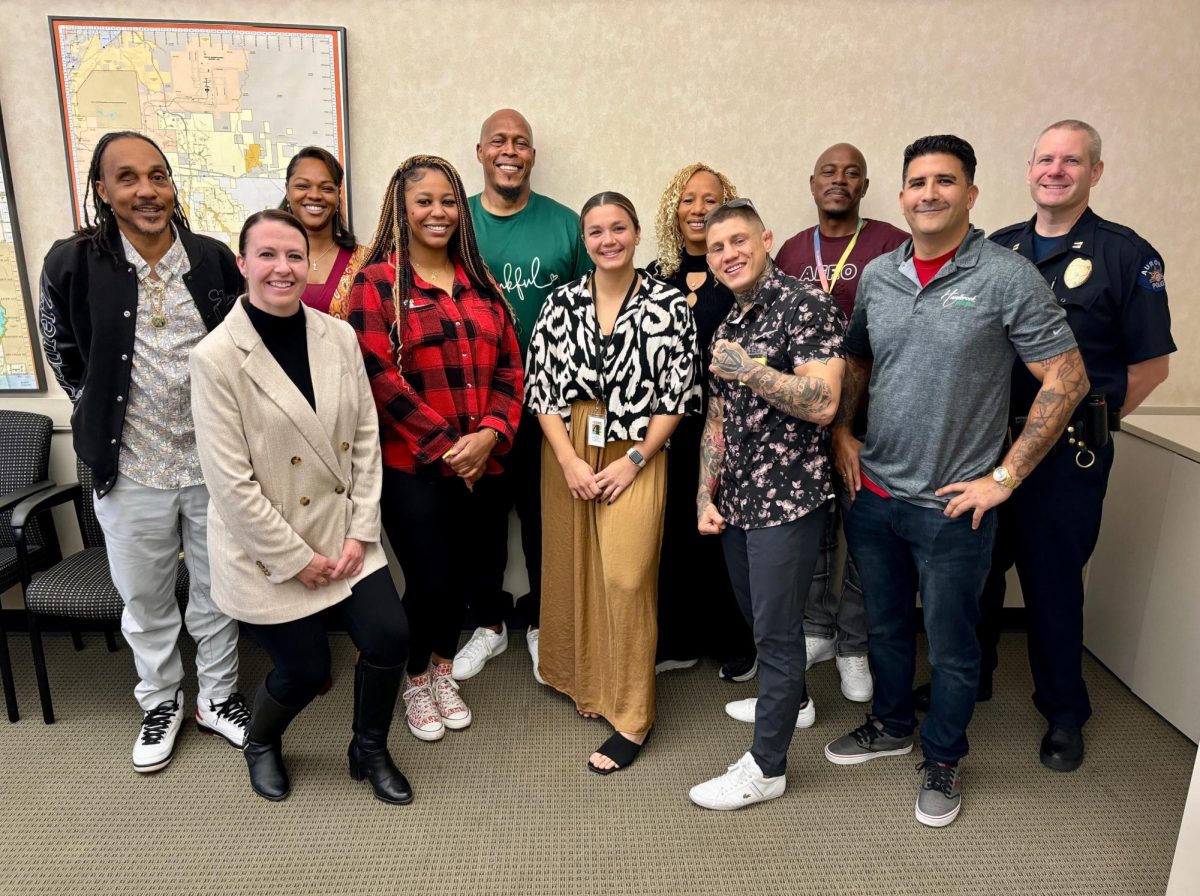Feature Photo By: Izzy Honey – This is a staged photo of junior Noah Sung that shows how many people are silenced when it comes to sexual violence. Many cases have shown that those who come forward are shamed for their experiences.
“No Jail Time for 18-year Old Accused of Raping Two Teens,” the TV screen displays on the daily news. “Judge Spares Prison Time for 19-year old Who Raped 2-year old Child,” is covered by nearly every large media corporation two weeks later. “No Prison for Colorado Student Who Raped Helpless Freshman,” is making its way around Twitter.
These are all real and recent news headlines, and as often as we see this type of news story, it seems as though little is being done to prevent it, experts say. These cases usually end with the perpetrator walking free or a news outlet discussing how it will hurt their reputation, but what is being done to help the survivors of sexual assault?

According to RAINN, an organization that specializes in sexual assault safety and prevention, every 98 seconds an American will be sexually assaulted. One in every five women and one in every 71 men will be raped in their lifetime.
It’s happening all over the world in your neighboring cities, your local college campuses, and even your own high school. The National Sexual Violence Resource center reports that 11.2% of all college students experience sexual assault and 30% of survivors were 12-17 years of age at the time of their assault, or in other words, the same age of Rangeview High School students.
These statistics bring up the question of whether or not schools are doing enough to raise awareness about the problem, many say.
“It comes down to education. How can you feel safe about something if you don’t necessarily know that it’s a problem or it exists?” says Rangeview English teacher, Cary Smith. “There aren’t conversations about consent and people aren’t talking about victimization or where to go, how to go there, or organizations that can help.”
In fact, many are unaware of Title IX, a law requiring federally funded schools — this includes Rangeview — to combat sexual violence and harassment, and respond to survivors’ needs in order to ensure that all students have equal access to education.
“Educating people about it [sexual violence] before it happens, preventing it from happening, having a good counseling system with people that are open and safe, and having good relationships with your teachers,” said senior Chris Arias when speaking from personal experience about how to help prevent sexual assault. “If I didn’t have good relationships with my teachers I wouldn’t have told anyone.”
So, how can we combat “rape culture”? Here are tips from experts in sexual assault prevention:

- Have conversations with your partner. Make sure everything is consensual.
- Speak up and advocate for victims.
- Don’t laugh at sexual assault in real life or in the media.
- Be cautious of what you say; avoid degrading comments or terms.
- What to say instead:
- “This is not your fault.”
- “How can I help?”
- “I’m here if you want to talk.”
- “I know there are resources to help if you want.”
According to Rangeview counselor Mrs. Atencio, when a sexual assault is reported to Rangeview, students can be referred to the Aurora Mental Health program that is in the building. If the incident needs to be reported to the police, students can then be eligible to receive Victims Services that offer counseling and support groups.
“If you look at the statistics and the number of students that come through our office it’s not anywhere near those statistics,” says Atencio. “I think that it’s so private and so personal that for some people, school is almost like a sanctuary where no one knows and they can choose to tell who they want.”
How can students feel safe reporting sexual assault, if there seems to be a lack of information/ education about the subject? Some sources believe that marginalizing sexual assault as a normal part of life is causing more harm than good.
“People are afraid to talk about it and it happens, so we should talk about it,” says Arias. “As much as we should work on preventing it, we should work on knowing what to do in this type of situation.”
In January of 2015 former Stanford student, Brock Turner, served three months of his six month sentence for sexually assaulting an unconscious woman on the campus.
Many people have commented that perhaps the victim was equally responsible for the assault. They ask, “What were you wearing?” “Were you drinking?” “Did you try to stop it?” before they punish the offender or offer support to the survivor. Certain news outlets have been accused of favoring the future of the “intelligent”, ivy-league convict and claiming that they could never commit an act so terrible.
“We blame the victim,” explains Smith. “We teach our daughters to cover up, we teach them that their behavior is paramount, not necessarily our sons to respect women or not to curb their behavior and this starts from a very young age.”
Sexual harassment can be any form of attention in a sexual nature that isn’t asked for. It isn’t always physical; it can be verbal in forms of catcalling, degrading jokes, and intrusive questions or comments.
Anytime you are feeling uncomfortable from unwanted attention from anyone, or the situation isn’t consensual, you have the right to report it, experts urge. Consent is a mutual agreement with a clear understanding that each person is comfortable with the situation.
Experts say it isn’t consensual if:
- She/he says no.
- She/he is unconscious.
- She/he is silent.
- She/he is feeling pressured.
- She/he is unclear in communication.
- She/he is intoxicated.
Societal stigma surrounding sexual assault has led many victims to remain silent because of the shame surrounding their experiences, resulting in 63% of sexual assault cases going unreported to police (RAINN).
According to The Blue Bench, a Denver-based sexual assault support and prevention center, 90-98% of rape reports are true, yet 97% of perpetrators don’t spend a day in jail.
If you or a loved one would like to report an incident, there are plenty of resources that will offer support, even if you want to remain anonymous.

Resources for reporting sexual assault:
- 911 if in immediate danger
- Visit a local medical facility — you can be treated for injuries, report the incident, or have a sexual assault forensic exam in a facility.
- Rape and Sexual Assault Hotline: 1-800-656-4673 (available 24 hours a day)
- The Blue Bench http://thebluebench.org/welcome.html
- A friend, family member, or counselor at school.
According to experts, in order for the overall rate of sexual assault cases to decrease, schools should be safe environments for all students, including survivors. If educational programs are put in place in more schools that inform students on how to report sexual assault, what consent is, and how to recover, it’s possible that there can be a significant change.






